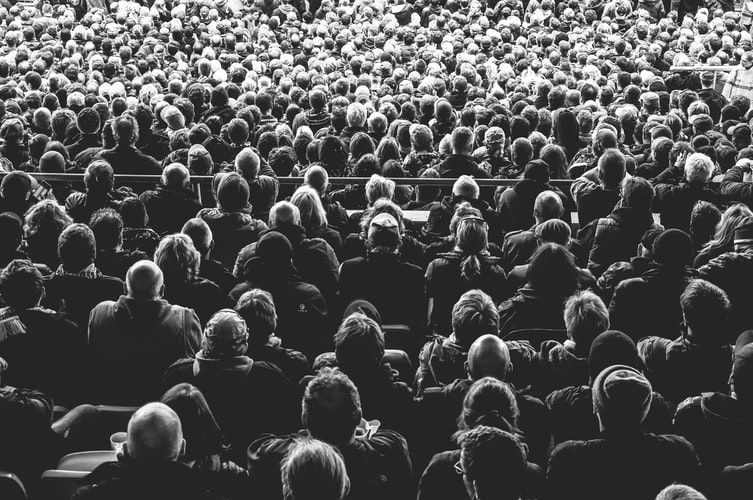The term “media” usually covers a wide variety of mass-communication means – including, but not limited to, ‘television, radio, and the press collectively’. It also encompasses significant developments in the Information and Communication Technology (ICT) including the rise of social media platforms. Traditionally, the freedom of the Media has been considered a key tenet of liberal democracy. It is the Fourth Estate that plays a role in ensuring checks and balances within democratic systems.
Therefore, it is important to explore the role played by the Media in achieving this objective – particularly in the American political sphere, where the ideals of democracy, liberty, and free speech reign supreme. The failure of the Fourth Estate to function properly, especially in the presence of interlinked state and corporate influence – also described as the ‘State-Corporate Nexus’, can result in endangering democracy. Indeed, 90% of the Media consumed by more than 300 million Americans is controlled, guided, and provided by 6 companies only. This article will first explain the fundamental roles of the Media and will then delve into the ‘Media Game’ to explore the thin lines linking the state, corporations, and mainstream media.
Roles of the Free Media
The Free Media must play three basic roles to safeguard the well-functioning of democracy: an informative role, a watchdog role, and a diversity role. These three roles are highly interlinked and complementary.
The informative Role
The importance of the Media in maintaining a healthy democracy resides in the fact that it mediates communication within a large population in order to keep the public informed. This is critical in ensuring and enhancing participatory democracy. Independent Media acts as a mediator between the political class and the normal citizens; the ruler and the ruled, the governor and the governed. It bridges the distance between the public and private spheres by reporting accurate and up-to-date information.
On the one hand, this allows citizens to assess the efficiency and integrity of their government. Providing valid and truthful information is the only way to avoid manipulation and elevate the level of public debate. Democracy can only function in a country where the electorate are very well informed. This is because only an informed electorate can make informed decisions on election day. On the other hand, the informative function of the Media also plays a role in echoing the people’s demands to the governing elite. Representative democracy requires a participatory framework within which citizens can participate in the decision-making process. Media outlets play a vital role in operating and safeguarding this framework. In this sense, the Media’s representation of the public is also guaranteed by its informative role.
The advancement and diffusion of knowledge is the only guardian of true liberty.
James Madison
The Watchdog Role
Another important role that must be secured by the Media is the supervision of office-holders. This supervision can prevent any misuse of public assets and any abuse of power. Journalists assume the role of “the custodians of conscience” as they fulfill their investigative responsibilities. They strive to keep a critical eye on the government’s functioning. They represent the core of the Fourth Estate – the fourth branch of government that serves to maintain checks and balances. The ruling few are often separated from the general public, which means that the specifics of their conduct are frequently unnoticed. The average citizen cannot persistently observe and criticize the ruling elite. Therefore, the Media must occupy the gap that is caused by the distance between the governing elite and the governed public.
Through playing an adversary role, journalists provide the feedback that democratic systems need. They represent a counterweight to despotic government, a check upon the conduct of the ruling few.
Wassim Daghrir
The Diversity Role
The free press maintains its credibility, reliability, and objectivity through the depiction of variable perspectives and points of view. By reflecting a diversity of opinions, the Media avoids bias. This can further reveal the democratic nature of the environment within which they operate. Conveying a multitude of opinions is guaranteed in democratic systems as a result of the absence of censorship. There is also an emphasis on free speech and media liberty in liberal democracies. Accordingly, the Media must provide a marketplace of ideas. This does not only ensure diversity of opinions but also presents the average citizen with a platform through which his voice can be heard. The diversity role that the Media plays is critical for the functioning of democracy. Indeed, a political system that lacks a multitude of perspectives within the sphere of public opinion is closer to despotism than democracy.
The three roles that are mentioned above are fundamental for the well-functioning of the Media within a democratic system. Keeping the public informed, critically observing the government’s actions, and guaranteeing an intellectually diverse atmosphere are necessary for the Fourth Estate to safeguard democracy.
The State-Corporate-Media Game: Media as a Lapdog?
The Media cannot act independently from exterior motives and pressure when it is directed by a State-Corporate nexus that serves the interests of the political elite. The ‘State-Corporate nexus’ is a term that is used to describe the interlinked interests and agendas of private corporations and the political class. Operating under a similar framework automatically shifts the Media’s role from a watchdog – that keeps a critical eye on the government – to a lapdog that serves to please. Hence, informing becomes a matter of preference, and the diversity of opinions is reduced. Let us use the US Democracy as an example.
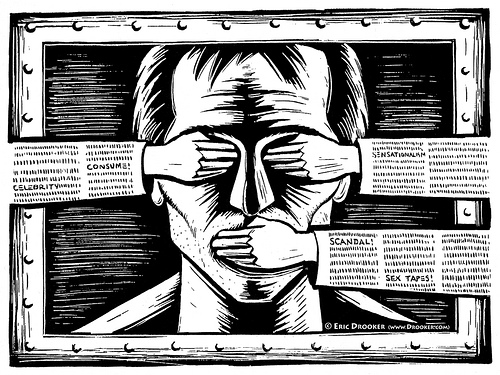
Corporate-owned Media
The enormous number of Media outlets that operate in the United States of America provide an illusion of diversity. This is because most of the Media that the public consumes is owned by 6 companies. These companies are known as “The Big 6”. It is true that independent Media exists in the US, but the major outlets are controlled by six conglomerates. These six companies are: Comcast, Disney, Time Warner, News Corp, National Amusement, and Sony. Ben H. Bagdikian, author of The Media Monopoly, describes these companies as the “Telecommunication Cartels”. His description is symbolic. It draws upon the convergence of Media as 6 giants own 90% of what the American public consumes.
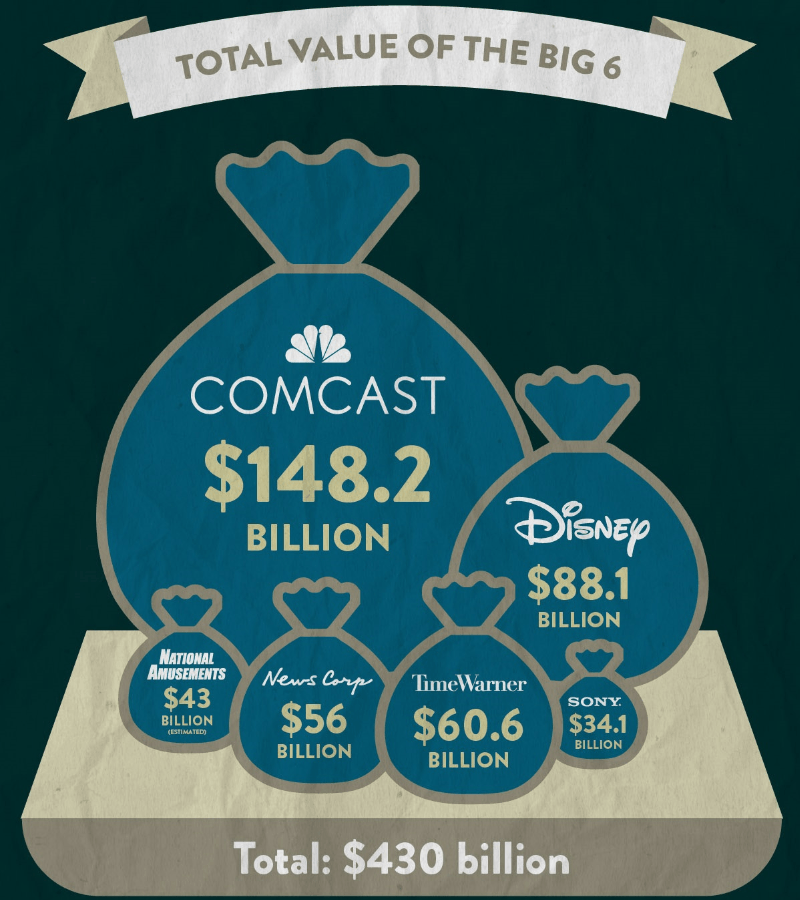
In fact, in 1983, 50 companies controlled 90% of the Media. This number was reduced to only 6 companies by 2011 when 232 media executives controlled the information flow in the United States. The fact that the Big 6 control the information flow means that they get to decide what to pass and what to suppress. They have full power to set agendas that match their private interests. They have the freedom of priming – in the sense that they get to decide what is important and what is not. The corporate-owned Media can also pick what they percieve as the ‘right’ interpretation to pass along to the public. Needless to say, these companies have the privilege of framing information as they see fit. They decide how news is presented; the tone, the text, the visual effects, the placement, etc.
Simply put, these companies decide what makes mainstream media mainstream. This means that American democracy is threatened by a continuous pressure to marginalize diversity of opinion and to impose a homogenized commercial and political media that is divided between partisan lines at best.
The Case of AT&T and Time Warner Merger
In 2016, AT&T announced plans to acquire the media giant Time Warner, owner of Warner Bros Studios, HBO, TNT, and CNN. The deal was estimated at a sum of $85 billion. However, the Trump Administration filed a lawsuit against both companies to block their merger. This came as a consequence of fears that the merger might lead to more Media consolidation and might harm competiton in the industry. Eventually, the Department of Justice failed to stop the merger from happening. On June 12, 2018, a District Court in Washington allowed both companies to complete their merger. This provides further proof of the concentration of Media in the hands of a small minority.
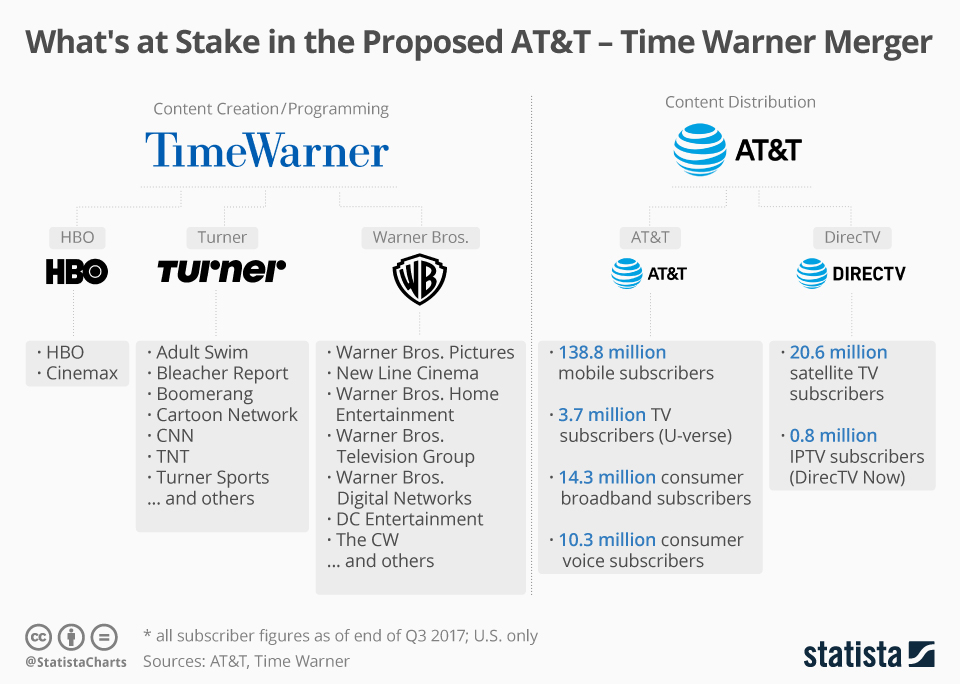
The State-Corporate Nexus
The monopolization of Mass Media by big corporations also results in maintaining and protecting the State-Corporate Nexus. This is because companies that play a part in funding and endorsing political parties operate Media outlets that serve the needs of the political elite. This presents a relevant process in what Noam Chomsky describes in his book Requiem for the American Dream as the concentration of wealth and power. It takes place as the wealthy put more money in politics and media to acquire the privilege of influencing the government’s policies. In this case, more money equates more Media consolidation. This results in a vicious cycle of concentration of wealth and power which threatens the well-function of American democracy.
Chomsky also describes this issue in his book Manufacturing Consent. He provides an account of the manners through which Mass Media shapes the information flow. Media manipulation results in influencing the public to fall in line and approve the government’s policies without criticism. Chomsky identified five filters through which the Media manufactures consent in the U.S: (1) ownership, (2) advertising, (3) official sources, (4) flak, and (5) marginalizing dissent. This is anti-democratic as it essentially neglects the public interest. It further manipulates the people into supporting policies that are not in their best interest.
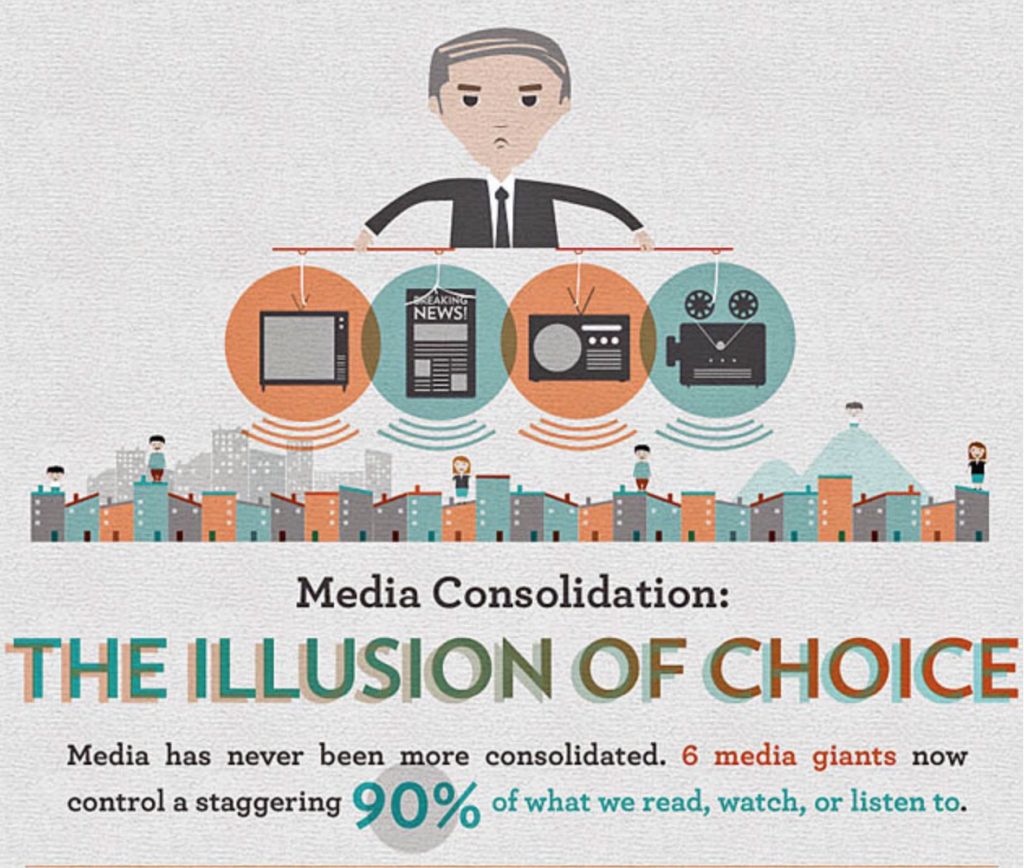
Official Media
The U.S government releases extensive amounts of information on a daily basis that the Media systematically regards as “official”. This can result in the absence of criticality in dealing with such information and can eventually allow the government to set the Media’s agenda. The government possesses a professional public relations machine that carefully controls what should be made public and should remain hidden. Professor Wassim Daghrir, author of The Media and Politics in the United States, argues that the American government provides a regular flow of information that exceeds the demands of daily journalism. This makes the government the agenda-setters of the original agenda-setters (The Media). He also describes the governmental public relations machine as a set of employees whose task is to manage news in a way that suits the interests of their employer.
Furthermore, he argues that the Media-Government relationship is based on mutual-dependence. This contradicts with the watchdog image that ideally characterizes the Free Media. Accordingly, much of the news management in the American political sphere is directly and indirectly set by the government. This is because the government can control the news through different ways. For example, it can withhold information as well as pressure and remove reporters from the White House. It can also impose self-censorship through editorial guidance and anticipatory avoidance.
Any dictator would admire the uniformity and obedience of U.S Media.
Noam Chomsky
As such, the American Media usually provides multiple adaptations of the same opinion instead of providing multiple opinions. They give the public the illusion of choice and diversity instead of uplifting the nature of intellectual debate. This can result in passive debates seeing that a broad spectrum of perspectives cannot exist when the Media are controlled by an elitist minority. This minority controls the information flow for more than 300 million people in the US. In consequence, the lack of diversity and criticality shifts the Media’ role from a Watchdog to a Lapdog.
Filling the Void: the role of civil society in media
The negative impact of Media and the State-Corporate Nexus on US Democracy presents an opportunity for civil society and non-governmental organizations. They can balance the scene by raising awareness and creating alternative Media outlets. Volunteerism in this particular area can prove to be very beneficial. It can serve to inform citizens with objective and balanced information and ensure the continuation of democratic practice. Alternative Media does not have to be right-wing media, as propagated by many. It does not even have to be political Media. The aim would be to provide the average citizen with facts, truths, objective opinions, and multiple interpretations.
For instance, in the aftermath of George Floyd’s death, Unicorn Riot– a decentralized non-profit media organization, played a critical role in covering the mass protests in Minneapolis and other American cities. On the one hand, mainstream Media focused on protestors looting stores and circulated images of police officers kneeling with other protestors. This helped in enhancing Public Relations (PR) for police force departments. On the other hand, alternative Media platforms, like Unicorn Riot, made sure to cover police brutality. They showcased scenes that were supressed by the mainstream Media.
In fact, a recent Gallup poll showed that only 9% of Americans trust mainstream Media “a great deal”, whereas 27% don’t trust the Media “very much” and 33% don’t trust the Media at all. This is precisely why it is important for independent Media organizations to assume a role in managing the information flow within the US.
Supporting Alternative Media
One of the best ways to support alternative Media is advocay journalism and alternative journalism. People can volunteer to write articles and opinion pieces for different platforms to make their voices heard. They can also support dissident voices in journalism and Media in general by protesting governmental pressure on press freedom. This can be clearly seen in US attempts to have WikiLeaks founder Julian Assange tried for espionage and hacking. The only thing that Assange did was expose the things that the State-Corporate nexus pressured the Media to supress. He used an alternative Media platform, WikiLeaks, to fulfill this mission.
Alternative Media can gain precedence and replace mainstream media – especially with the rise of ICT and the increasing dependence on social media platforms. This can be especially useful seeing that social media platforms are being utilized to manipulate and guide public opinion. Therefore, the current state of information technology and Media outlets desperately requires the emergence of significant alternatives with honest approaches and democratic goals.
IVolunteer International is a 501(c)3 tech-nonprofit registered in the United States with operations worldwide. Using a location-based mobile application, we mobilize volunteers to take action in their local communities. Our vision is creating 7-billion volunteers. We are an internationally recognized nonprofit organization and is also a Civil Society Associated with the United Nations Department of Global Communications. Visit our profiles on Guidestar, Greatnonprofits, and FastForward.
